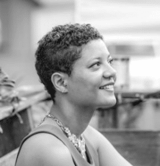Summary
The last year-and-a-half of crises demonstrate why researchers and designers must anticipate and plan for trauma as it emerges in our work (and our lives). This session is an introduction to trauma-informed design frameworks. Through real-life examples, attendees will see how concepts from care fields, like social work, are integrated into the research and design process to center the safety and empowerment of the individuals and communities we serve. Attendees will leave the session with an understanding of how they can begin to explore using trauma-informed frameworks in their own practices.
Key Insights
-
•
Trauma differs from stress and mental health issues; it involves a deep rupture in meaning and identity.
-
•
Mass trauma from the pandemic will affect societies for decades, requiring trauma-informed design approaches.
-
•
Designers must move from trauma sensitivity to trauma responsiveness, embedding trauma principles throughout their work.
-
•
Integrating social work values—like authenticity, integrity, and compassionate inquiry—strengthens trauma-informed design.
-
•
Victor and Sylvia Margolin exemplify historic collaboration between design and social work to pursue socially responsible design.
-
•
Design research risks exploiting vulnerable participants if trauma-informed ethical standards are not applied.
-
•
Six trauma-informed care principles can be adapted to design: safety, trust, peer support, collaboration, voice & choice, and cultural-historical awareness.
-
•
Anti-racist work is essential and inseparable from trauma-informed and trauma-responsive design.
-
•
Moving at the speed of care and hospitality rather than speed of trust enhances trauma-responsive design collaboration.
-
•
Integrity designers anticipate and proactively minimize harm, embracing the inevitability of damage in design decisions.
Notable Quotes
"Trauma is a rupture in meaning making; the way you see yourself, the world, and others is shocked and overturned by an event."
"Trauma isn’t just from sharp shocks; it often cascades from sustained feelings of helplessness."
"We are all swimming in a sea of collective overwhelm, whether directly impacted or not."
"Many professionals share the goals of socially responsible design; helping professionals and designers must find ways to collaborate."
"Our ability to entice participants to share personal stories raises the risk of exploiting them for materials."
"People must feel emotionally, physically, and psychologically safe in the spaces we design."
"All design choices must be transparent to maintain trust with clients, staff, and those with lived experience."
"We need integrity designers who proactively minimize damage; harm is inevitable, but damage is not."
"What if we moved at the speed of care, support, and hospitality instead of just the speed of trust?"
"To be anti-racist, you must be trauma informed; to be trauma informed, you must commit to anti-racist work."
Or choose a question:
















More Videos

"Jobs always ask for three references. I think I might start asking for three happy employees."
Zariah CameronReDesigning Wellbeing for Equitable Care in the Workplace
September 23, 2024

"The real trick is being able to say no gracefully and communicate your priorities effectively."
John Cutler Harry MaxPrioritization for designers and product managers (1st of 3 seminars) (Videoconference)
June 13, 2024

"Every time somebody purchased a domain name, I earned a commission. Over three to four years, I earned over $100,000 as a high school student."
Nick CochranGrowing in Enterprise Design through Making Connections
June 3, 2019

"Use pilots as a tool to get buy-in from stakeholders and provide evidence for why change might be needed."
Deanna SmithLeading Change with Confidence: Strategies for Optimizing Your Process
September 23, 2024

"Breathing and resisting the urge to rush is essential because rushing will not help."
Magdalena ZadaraZero Hour: How to Get Far Quickly When Starting Your Digital Service Unit Late
November 16, 2022

"We asked people to step out of their comfort zones and do things they'd never done before."
Nova Wehman-BrownWe've Never Done This Before
June 4, 2019

"We need to learn the domain, the technology, the algorithm, and the data—not enough to code, but enough for meaningful discussions."
Liwei DaiThe Heart and Brain of the AI Research
March 31, 2020

"Having workers leave the airport and travel to the farm to self-isolate was simply not feasible – the province would have to be responsible for quarantine."
Gordon Ross12 Months of COVID-19 Design and Digital Response with the British Columbia Government
December 8, 2021

"The doing is the same; the being is entirely different."
Tutti TaygerlyMake Space to Lead
June 12, 2021
















